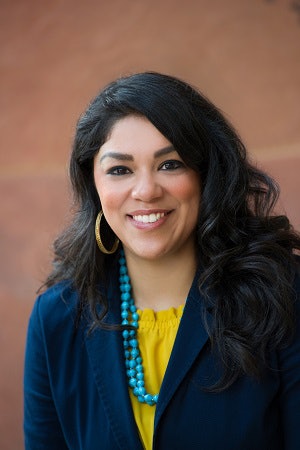Dr. Vanessa Sansone has used her personal background of being a first-generation college student and growing up in a low-income community as influence for her teachings and research on underrepresented groups.
 Dr. Vanessa Sansone
Dr. Vanessa SansoneSansone, who is an assistant professor of Higher Education Administration in the Department of Educational Leadership and Policy Studies at the University of Texas at San Antonio (UTSA), was raised on the east side of San Antonio which she described as being similar to “any urban inner-city marginalized community”.
Going into high school, Sansone was offered a sports scholarship by a local college preparatory school. During her time there, she found many reasons to attend college.
“What influenced me as a first-generation was the fact that I had to commute 45 minutes a day from my community to the ‘good side of town,’” says Sansone. “I began to see the inequity of where you’re from and how much zip code mattered. I kept seeing that a common pattern between my friend’s parents who were successful and were affluent was the fact that they had a college degree. And so that pushed me to pursue that.”
Attending college was something that Sansone had to navigate on her own because she was a first-generation college student, not only amongst her parents, but also within her extended family.
“The reason why I took all that on was to get out of poverty,” says Sansone. “It was not only just for myself, it was for my family. So this idea of community uplift too, familial uplift, it was trying to be that one that got out of poverty but also help my own family and hopefully my community which is still what I do to this day with my own research in higher education.”
Sansone’s experience at the college prep school prepared her academically for her undergraduate years at St. Mary’s University at San Antonio, Texas. However, other aspects of college made adjustment adjusting difficult for Sansone because she worked three jobs while being a full-time student in order to help support her family.
“Many of those navigational issues that students, like myself, have to deal with a lot of times don’t translate into the policy world and higher education,” says Sansone. “That shaped me significantly because it actually made me mad sometimes just thinking about how my affluent peers didn’t have to worry about the stuff that I had to worry about. It wasn’t just studying, it was surviving.”
For both her masters and doctorate degrees, Sansone attended UTSA. She applied for and was awarded with a doctoral fellowship program and continued to conduct research. Throughout her career, Sansone has focused on research topics such as college affordability, Latino students, student veterans, and Hispanic-serving institutions.
Last year, she was hired as an assistant professor and has found benefits working for not only her alma mater but also working within the community that she grew up in.
“When we are talking about diverse populations, especially underrepresented minority populations, that’s really difficult to do because you have to have trust,” says Sansone. “You have to give back to the community. I don’t believe in ‘drive-by research’ where somebody comes in and does this and that’s it and they get all the benefits from it. I really think that it does take time and investment.”
At UTSA, Sansone teaches statistics, assessment with student affairs and a master’s level course on school-community relationships.
Over two years ago, in correlation with her research, Sansone created Colegio en Nuestra Comunidad, a college fair that was held in a low-income San Antonio community.
“What I decided to do was use my capital,” says Sansone. “I said, ‘I’m going to use the fact that this is a minority type community in a geographically isolated area that tends to get overlooked for help and support and I’m actually going to put a college fair there.’ Even just the fact that I put a college fair in this community was kind of seen as radical.”
To Sansone’s surprise, 800 students attended.
Sansone acknowledges the impact that her mentors and husband have had on her career thus far. AdditionallyIn Addition, she says that her ultimate career goal is to be able to influence policy at both the local and federal level.
“I really want to influence policy,” says Sansone, adding that she is focuses on tackling inequities head on. “I live it and every day I see it. It is just getting worse. A major goal is that my research actually benefits a broader audience and not just a specific group. And keep in mind too that I don’t mind doing that on a more micro-level. So even if it’s just influencing policy just here, in this city, in this state, that’s what I’m about.”
This article appeared in the August 9, 2018 of Diverse
Sarah Wood can be reached at [email protected]



















